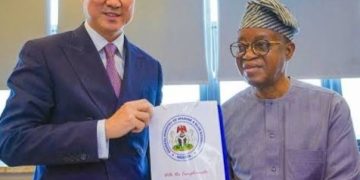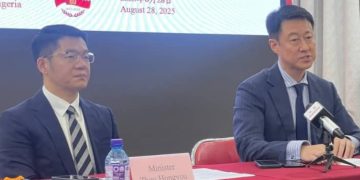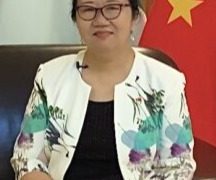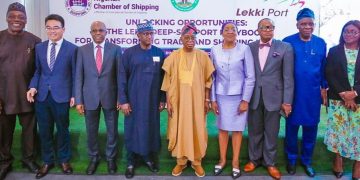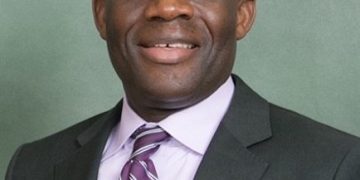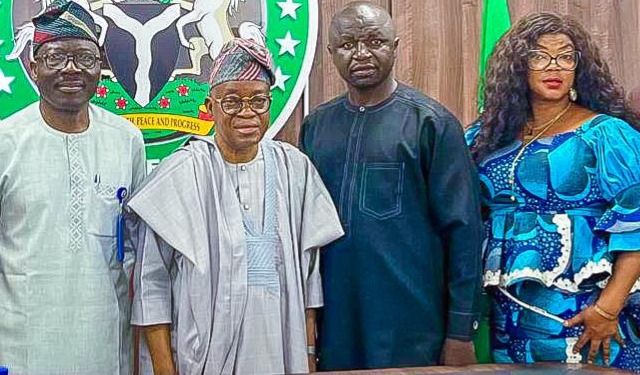- Minister of Marine and Blue Economy, Adegboyega Oyetola (second left), Permanent Secretary of the ministry, Olufemi Oloruntola (left), Acting President, Fisheries Cooperative Federation of Nigeria, Mashi Sani, and Secretary, Abuja Women in Fish Farming and Aquaculture, Ekomabasi Uwem, when Oyetola hosted an interactive session with fisheries cooperatives groups in Abuja…Wednesday
By Anthony Nwachukwu
The federal government has outlined some strategies to transform the nation’s aquaculture sector into a powerhouse of food security, employment and export competitiveness.
Disclosing this in Abuja on Wednesday during a high-level consultative meeting with fisheries cooperative groups in the Minister of Marine and Blue Economy, Adegboyega Oyetola, declared that “Nigeria must chart a new course towards self-sufficiency in fish production.
He vowed to end Nigeria’s dependence on fish importation by aggressively boosting local production. He stated: “We will scale up domestic fish production, reduce dependency on imports, and reposition the sector for sustainable growth,” according to A statement by the Special Adviser on Media and Communications to the Minister of Marine and Blue Economy, Dr. Bolaji Akinola.
Oyetola, who declared that “Nigeria must chart a new course towards self-sufficiency in fish production,” said the federal government is fully committed to supporting the fisheries and aquaculture subsector through policy, technical support and financial inclusion.
Convened by the Federal Ministry of Marine and Blue Economy, the meeting brought together leaders and members of major fisheries and aquaculture associations, including the Fisheries Cooperative Federation of Nigeria (FCFN).
The others were the Tilapia Aquaculture Developers Association of Nigeria (TADAN), Catfish Farmers Association of Nigeria (CAFAN), Women in Fish Farming and Aquaculture, as well as the Practicing Farmers Association of Nigeria.
According to Oyetola, the ministry is intensifying efforts to support women and youth in the fishing sector, with start-up grants and other empowerment initiatives already in the pipeline, as the federal government prioritises youth engagement and economic diversification.
“Increasing youth participation in aquaculture is not only vital for food production but also a strategic solution to reducing unemployment,” the minister stated. “We are committed to ensuring that young people and women are not left behind in this transformation.”
Meanwhile, participants have listed the challenges to the sector to include overfishing, environmental degradation, lack of access to affordable finance. and post-harvest losses. The others are inadequate cold storage infrastructure, poor transportation and market linkages, low youth involvement, multiple taxation by local government authorities, and the rising cost of imported fish feed.
Responding to these concerns, Oyetola said the ministry was already engaging both local and international stakeholders to tackle the identified issues head-on.
He disclosed that discussions were ongoing with the World Bank to secure financial support for fish farmers, while the ministry would be collaborating with the Nigerian Agricultural Insurance Corporation (NAIC) to ensure affordable and accessible insurance coverage for fish farmers across the country.
“We are also in talks with the Federal Ministry of Water Resources to replicate the successful aquaculture model at the Oyan Dam in other parts of the country,” he added, pointing to integrated planning and inter-ministerial cooperation as key pillars of the strategy. He added that the meeting was not the end, but “the beginning of a sustained and transformative dialogue.”
On his part, the Director of Fisheries and Aquaculture, Wellington Omoragbon, highlighted the importance of strengthening institutional frameworks and adopting enterprise-driven models to enhance productivity and attract funding.
For the participants, the initiative was “timely and long overdue,” as they expressed hope that the consultative approach would lead to actionable results.


